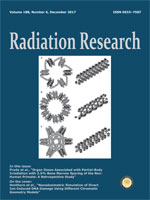Radiation stimulates the expression of inflammatory mediators known to increase cancer cell invasion. Therefore, it is important to determine whether anti-inflammatory drugs can prevent this adverse effect of radiation. Since cyclooxygenase-2 (COX-2) is a central player in the inflammatory response, we performed studies to determine whether the COX-2 inhibitor NS-398 can reduce the radiation enhancement of cancer cell invasion. Thighs of Balb/c mice treated with NS-398 were irradiated with either daily fractions of 7.5 Gy for five consecutive days or a single 30 Gy dose prior to subcutaneous injection of nonirradiated MC7-L1 mammary cancer cells. Five weeks later, tumor invasion, blood vessel permeability and interstitial volumes were assessed using magnetic resonance imaging (MRI). Matrix metalloproteinase-2 (MMP-2) was measured in tissues by zymography at 21 days postirradiation. Cancer cell invasion in the mouse thighs was increased by 12-fold after fractionated irradiations (5 × 7.5 Gy) and by 17-fold after a single 30 Gy dose of radiation. This stimulation of cancer cell invasion was accompanied by a significant increase in the interstitial volume and a higher level of the protease MMP-2. NS-398 treatment largely prevented the stimulation of cancer cell invasion, which was associated with a reduction in interstitial volume in the irradiated thighs and a complete suppression of MMP-2 stimulation. In conclusion, this animal model using MC7-L1 cells demonstrates that radiation-induced cancer cell invasion can be largely prevented with the COX-2 inhibitor NS-398.
How to translate text using browser tools
28 September 2017
Tumor Cell Invasion Induced by Radiation in Balb/C Mouse is Prevented by the Cox-2 Inhibitor NS-398
Rosalie Lemay,
Martin Lepage,
Luc Tremblay,
Hélène Therriault,
Gabriel Charest,
Benoit Paquette
ACCESS THE FULL ARTICLE

Radiation Research
Vol. 188 • No. 6
December 2017
Vol. 188 • No. 6
December 2017




